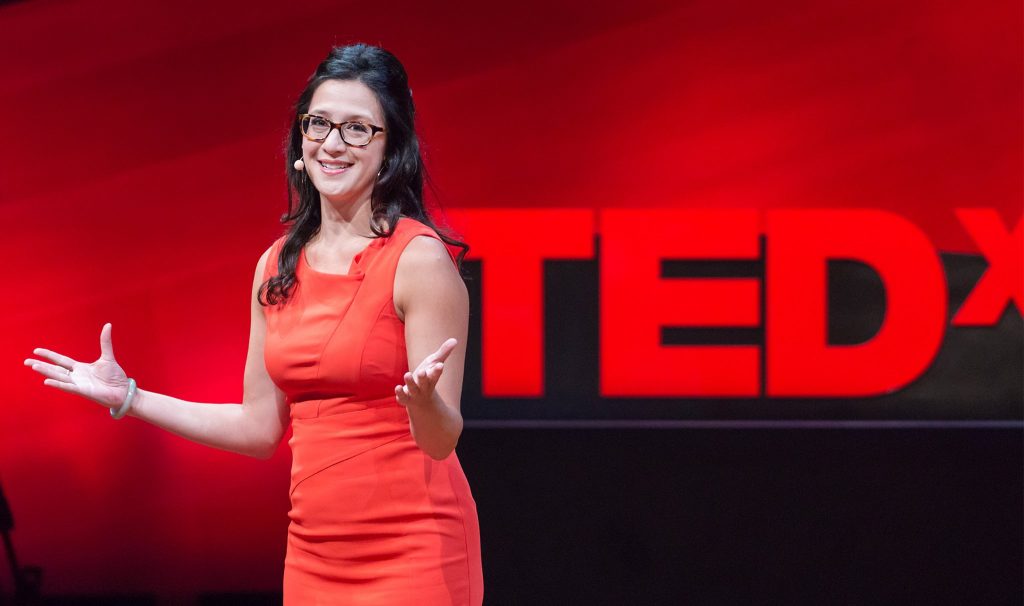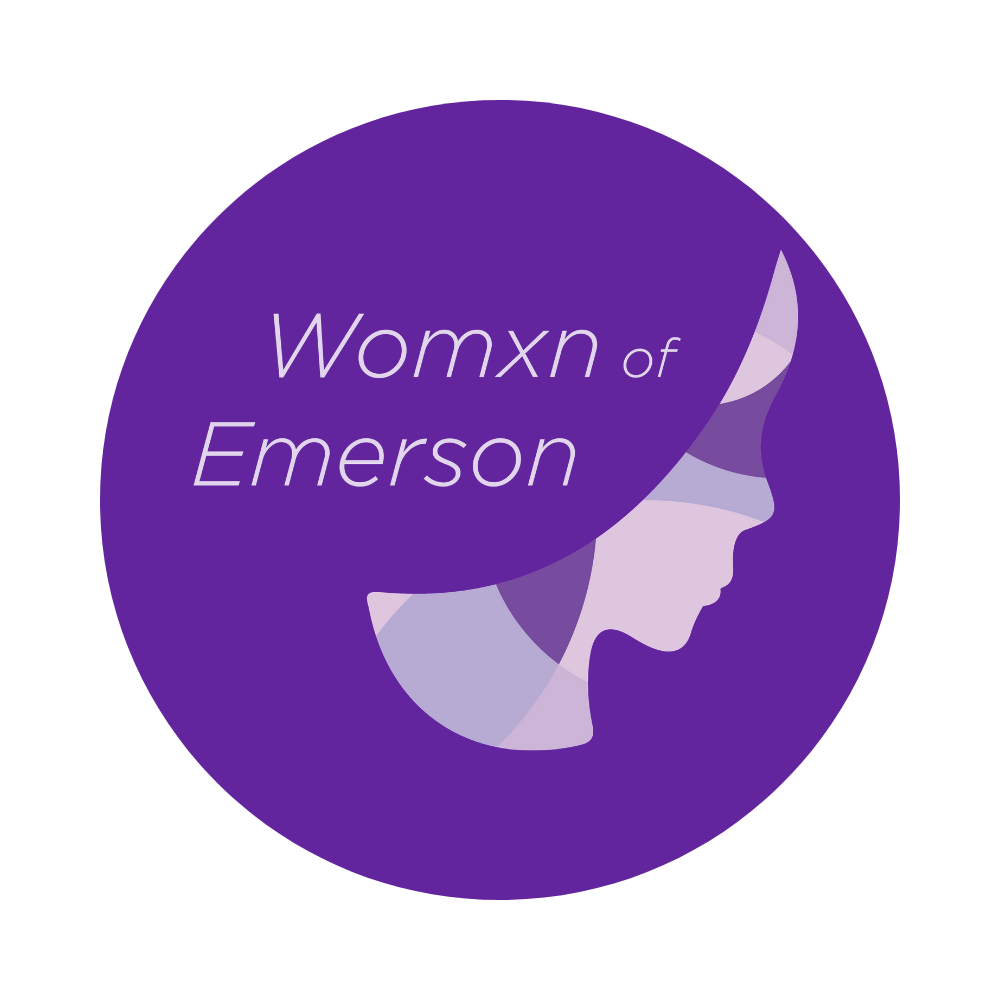Terri Trespicio ’02 is an award-winning writer, speaker, and brand advisor who helps professionals of all stripes harness their creative genius to let their brilliance speak. Her TEDx talk, “Stop Searching for Your Passion,” has more than 5 million views. She was recently named by Hubspot as one of the “Top 18 female speakers who are killing it” and cited as one of the world’s leading creatives by Creative Boom magazine.
A former magazine editor and radio host at Martha Stewart, she has appeared on the Today show, Dr. Oz, The Early Show, The Martha Stewart Show and The Anderson Cooper Show. Her work has been featured Oprah magazine, Marie Claire, Prevention, Business Insider, Forbes.com, and Inc.com. She leads several events and retreats each year for people who want to surface their own creative genius.
An in-demand, top-rated speaker, Terri is also a stand-up comic and has performed all over New York City and beyond. She lives in Manhattan.
Start tapping your creative potential with her free guide, “5 Ways to Unlock Your Creative Genius,” at terrisentme.com.

How did you Master’s program at Emerson help with your career?
Terri: “If we’re being honest, I didn’t apply to the MFA Creative Writing program at Emerson because of where it could ‘get’ me. In fact, I said as much in my application essay. I said, specifically, that I didn’t want to earn my MFA because of what I would ‘get’ by virtue of that degree, but because I wanted to be there. I wanted to read and write and study and expand my horizons and meet people who were living and breathing their work to see what that looked like, sounded like. It was a privilege to be there, and I wanted to be there.
I didn’t come there to learn how to write, or because I knew what I was going to do (I didn’t). I applied to one school and one program only (this one) and it was because it was the only one that spoke to me. I read through the description of the other programs at Emerson too—but the MFA was simply where I wanted to be. It was what I wanted to do.
I think by virtue of choosing and enrolling at Emerson, I was listening to myself in ways that I would later learn are the right reasons for choosing: because it feels right. When I read about the MFA, I felt an expansiveness, a sense of what was possible. The publishing program is amazing, too, but when I thought ‘should’ I do that program instead? I knew the answer was no.
The work I did there, reading, writing, learning to discern great work from not great, I further honed my sensibility as a reader and writer. I educated my instincts, which is what I think all great education should do, and got to see what my work had the potential to become.
One other big reason I wanted Emerson was because of the teaching fellowship. It was a huge draw, as I felt called to teach in some shape or manner. When it came time to apply for the fellowship, my friends worried that it was going to be too hard, too competitive, and you know what? I never doubted for a moment that I’d get it. And I did.
That opportunity to learn to teach—to create a curriculum, to engage a classroom—changed my life. Dawn Skorczewski, who headed up the program, was an incredible mentor. I went on to teach as adjunct faculty at Emerson in the MA program (irony!), and all of that influenced my ability as a speaker, instructor, and workshop facilitator today. I credit a fantastic fellowship program and Dawn for giving me the tools I continue to use.
As for career? I didn’t go to Emerson simply to get a job; you can get a job without going to Emerson; most people do. But in truth it was via a fellow student at Emerson that I landed my first magazine job, not as an editorial assistant, but an associate editor, at Body+Soul magazine, which was later purchased by Martha Stewart. And that job is how I ultimately got to move to NYC. That job sent me on the career trajectory of publishing and media that has shaped and influenced my career to this day.”
Why did your start your own business?
“Um…I got laid off. That’s about as good an impetus as you can get! I lost my job at Martha Stewart’s Whole Living magazine (which closed not long after), and decided, well, that was fun and I’m not sure I need another job at a magazine…or another job, period.
So, I decided to see what I could do to scare up some work while staying home. And I did that. I reached out and let everyone I knew know that I was available to hire as an ad hoc writer/editor/content creator. For the first few years, I took all kinds of projects on, some I liked (copywriting and content production) and some I hated (public relations, no thank you). And what I did over those years was course correct, and continue to home in on what I was good at AND enjoyed, and promised myself that I would say no to things I didn’t want. I had to believe there was enough of the work I wanted; I was right.
I find it funny when people remark on how ‘risky’ it is to run your own shop, and how ‘unpredictable’ it is. I find it funny when people equate ‘unpredictable’ with ‘bad.’ Yes, the self employed person has good seasons and less good…but what I think is far riskier is to cast your lot with one job, one employer. I had done that, and was glad I had, but I lost that job so fast it made your head spin. There’s no way I can lose ALL my clients and ALL my opportunities in a single day, and so I in fact feel far more in control of my livelihood than I did when I worked for one entity.
Life as a consultant and speaker is pretty great. I love the challenge of holding a mic in one hand and the audience’s attention in the other. I love brainstorming with people on their brand language, distilling their ideas down to something they can use.
Also know that you don’t get to be like some kinda cowboy who doesn’t have to take bunk from anyone. Because whether you work for yourself or for a company, someone else is ALWAYS signing your checks. As a business owner, you don’t have one boss; you have dozens.
In addition to my consulting work, I run writing workshops and retreats for anyone who wants to find their voice on the page. I feel my old MFA roots rising to support the work I do helping people see the beauty and power in their own work, whether they consider themselves writers or not.
A woman said to me not long ago, ‘Maybe one of these companies you consult for will hire you full time.’ Why would I want that? I said. Her answer? ‘Predictability.’ I said, Well, you just named the one thing I don’t want.“

What’s some advice you would give students and alumni who struggle with telling their “career story” when networking and in interviews?
“My advice is this: Don’t say what you think others want to hear. People can smell bullshit a mile away. Anything you think might be a good idea to say, they’ve heard 1,000 times. Also realize that no one wants to listen to you walk back your career and spell out every bullet point on your LinkedIn; if you do, they may look like they’re listening, but they’re actually mentally scrolling through what they need to pick up on the way home tonight.
Find one starting point from which to tell a portion—a portion!—of your story. NO ONE wants the whole thing, and if they do, let them ask YOU for more information. Start with an exciting or low or fraught moment, and make an arc with your story, a mini arc, so they get a sense that what you’re about to tell them has a beginning, middle, and end. Think about how you like stories told. No one wants to hear a linear slog through the details of every last job. Focus instead on choices you made and why, key decisions that taught YOU something, and how they got you to where you are. Your job is to keep them interested, not force-feed the encyclopedia of your career to them in 15 minutes.”
We all bring ourselves to work. And we all have the opportunity to reflect on areas to grow as professional womxn. What are some of the internal biases you’ve had to recognize and address so that they don’t impact on your work?
“One bias I’ve had is that I have assumed everyone older/more seasoned than me knows things. That they may, in fact, know everything. But they do not. And I do not. I think most people are doing their best to guess their way through the day, based on what they’ve learned so far. I think there are assumptions we should never make, and they are:
- Never assume someone automatically knows more than you or knows the right answer. Because if you assume that, you may never speak up or advocate for something until too late.
- Never assume that people don’t like you or are out to hurt you. Most people are so utterly consumed with their own lives, careers, and standing, that they haven’t given a thought to you or any exchange you had.
- Also, never assume that you are anyone’s priority, either. The sooner you know this, the less hurt you’ll be.
- Never assume that you can’t do a thing. I do that all the time, and it’s a bad habit. Anyone with a brain in their head, an ounce of curiosity, and the willingness to find out the answers can get further than they thought.
- Never assume people know what in the hell you’re talking about. Because they don’t! They’re just too embarrassed to ask, and feel they should know (see my point above). EVERYONE is afraid of looking stupid, and so they nod along. Don’t be one of those people. When I don’t understand something or get a reference, I say so. And I don’t assume someone understands mine. Your job as a professional is to keep lines of communication wide open and that means making sure no one feels lost.”
What are some common issues you’ve noticed that women have to face in their careers and what are the issues that have impacted you based on your individual background?
“I think it’s very tricky when we talk about women-specific problems, and I’m careful when I genderize things. Yes, we have our own challenges because of the obvious: The world has a sordid history of not really giving a crap what women think. But be careful of coddling yourself or other women because they’re women. I think more often than not, the issues that confront us and cow us all are human issues, not gender issues.
However, I recognize this is a Womxn Centered story! And so I will say this: If there’s one thing you must stop doing, today, it’s this: Do not disclaim your work.
Do not apologize, put down, or make excuses for your work, your appearance, nothing.
Far too many of us are tentative, especially when in a position to speak in front of others, and we tend to put it down as a way of being (or seeming) humble—and I get this because it can be a game we play to ‘act’ less powerful so we don’t ‘scare’ anyone.
There are ways to be heard that don’t involve scaring anyone. In fact, when you scare someone, they will shut right down, stop listening, or challenge you directly.
But the way to gain support and recognition is NOT by disclaiming or excusing. We waste a tremendous amount of time when we do this, it’s not a good look, and all you’re doing is giving everyone an excuse not to listen. Stop giving the world permission to excuse you. They are not excused.”


